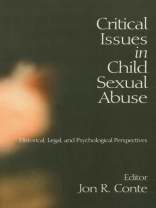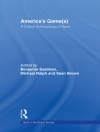The chapters in this book are intended to describe what is known and what is not known in several specific areas of childhood abuse. The opening interview with Roland Summit gives readers an opportunity to get acquainted with a pioneer in the field. An instrumental force in the study of child sexual abuse, Summit has indelibly impacted the work of the remaining authors and the field in general. The interview provides a personal and historical view of the development of the field and identifies problems and issues all professionals should be prepared to deal with.
A beginning chapter looks at the development of child sexual abuse research. Internationally recognized scholars, practitioners, and thinkers who have based their contributions on both research and practice experience emphasize the most critical unknowns in his or her area, reflecting on the subject much as Dr. Summit might have in the early days of finding out the now ‚knowns.‘ Chapters focus on sexual offenders, children′s memory, adult memory for trauma, children as victims, treatment challenges of traumatized victims, victims in court, and treatment of dissociate identity clients.
Inhaltsverzeichnis
1. Interview with Roland Summit
2. Prosecution of Child Sexual Abuse in the United States
. When Paradigms Collide: Roland Summit and the Rediscovery of Child Sexual Abuse
4. Scientific Support for Expert Testimony on Child Sexual Abuse Accommodation
5. Memory and Dimensions of Trauma: Terror May Be “All-Too-Well Remembered” and Betrayal Buried
6. Not Necessarily Politically Correct Reflections and Thoughts on Approaches to the Treatment of Traumatic
Über den Autor
Jon R. Conte, Ph.D. is the Joshua Children’s Foundation Distinguished Scholar on Child Sexual Abuse and Professor at the School of Social Work, University of Washington, Seattle. He is the Editor of the Journal of Interpersonal Violence and Trauma, Violence, and Abuse: The Review Journal. The founding President of the American Professional Society on the Abuse of Children, he currently serves on the APSAC Board as President Emeritus for Life. He maintains a private forensic practice specializing in issues of abuse, trauma, and psychotherapy.












